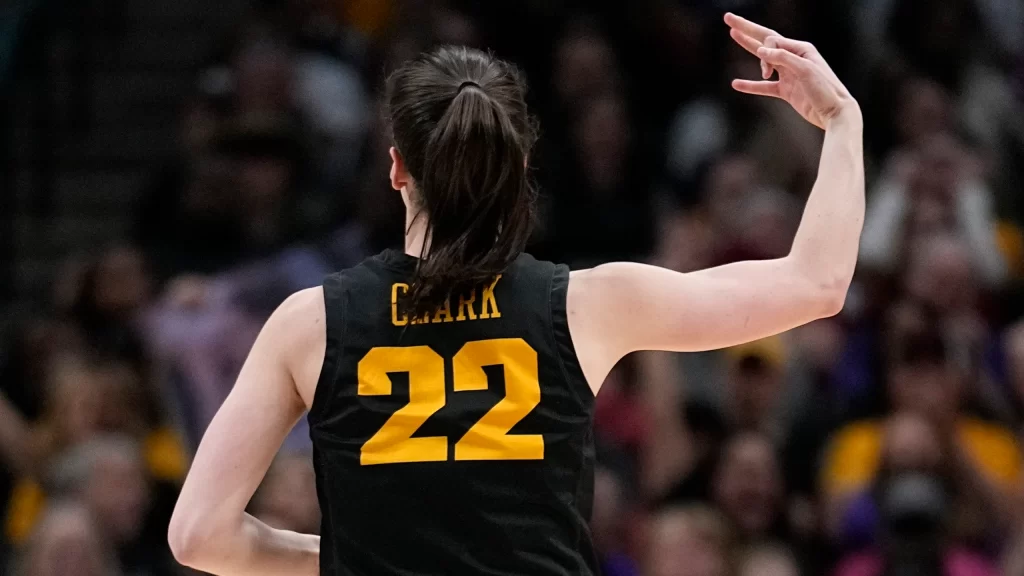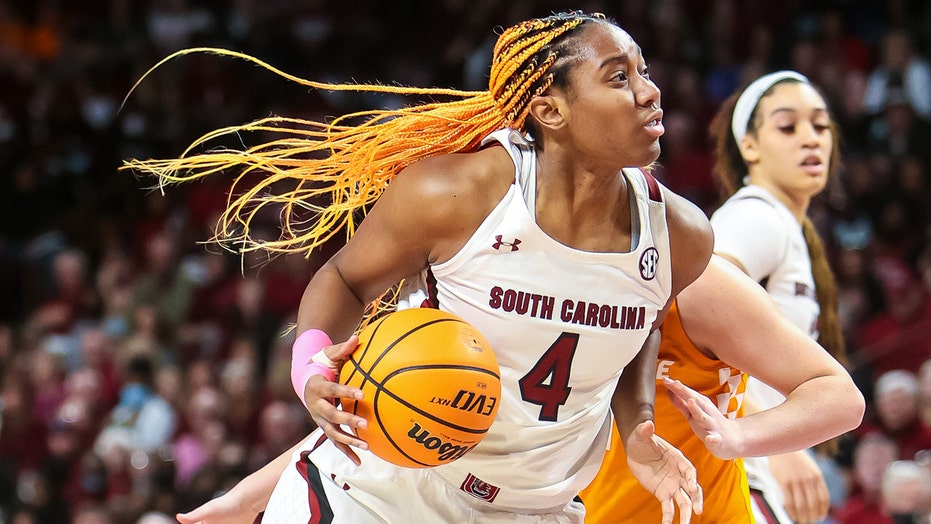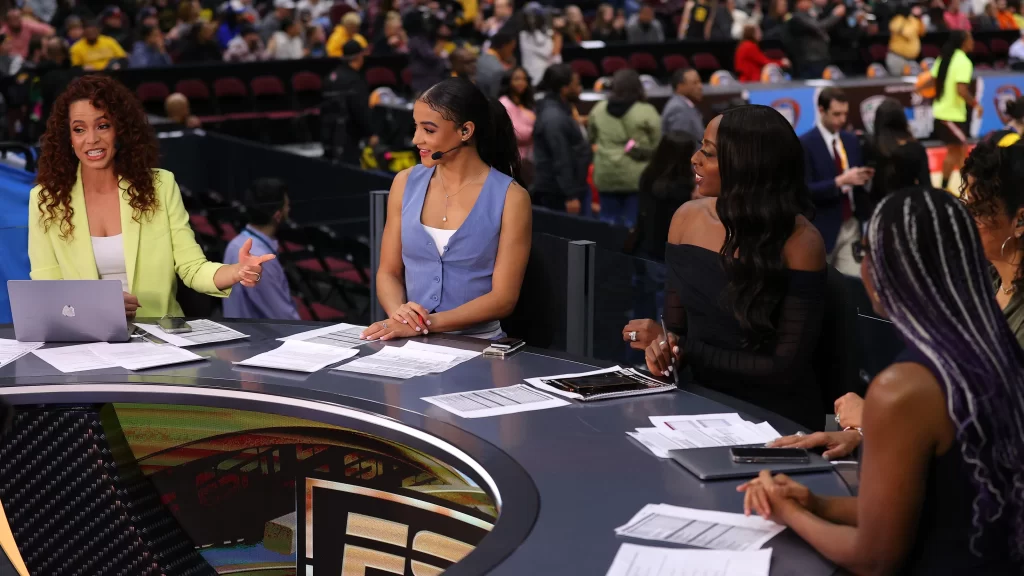
The visibility of women’s basketball is at an all-time high. More eyes are on the ladies than ever before. The media investment, corporate sponsorships, and fan engagement that people have been clamoring for are materializing. It would seem that there would be no downside to this. Unfortunately, that is not the case. Thrusting women’s hoops into the limelight without responsibly educating fans has led to unnecessary and unwarranted comparisons and extremely weird conversations. The game is growing but it seems as if weeds are sprouting instead of flowers blooming.
From the outside looking in, I’d assume this all looks glorious. Viewership records are being shattered on a nightly basis. But we just saw a team have a storybook year. Lost all five starters from a Final Four team. Steamrolled through the regular season. Had a miraculous ending in the conference tournament to preserve their run to perfection. Performed the ultimate coup de grace in the national championship by knocking off the team that beat them in the tournament last year. Instead of taking advantage of having the national gaze to amplify the history that was being made, these young ladies were relegated to a footnote in the story of how the NCAA women’s basketball season unfolded. The women’s game is adopting a coverage style that is very reminiscent of how the NBA has operated for the better part of the last 20 years. Sure it has brought many eyes to the game, many new possibilities for lucrative partnerships, and tons of new fans but in the words of our dearly departed brother, D’Angelo Barksdale, “Ain’t nothing good to it but the money.”
The most frustrating thing about this is these resources have always been there. It is painfully obvious now (always has been but I digress) that it has been a clear, and conscious choice not to give women’s hoops the limelight it deserves. Women’s basketball was not invented in the 2023-2024 collegiate season. There have been several phenomena that have been completely disregarded by mainstream media. The ’96 Olympic Team, ignored. The 4-peat UCONN Huskies, ignored. The Three Meeks, ignored. Sheryl Swoopes 47 pts in the national championship (NCAA record), ignored. To act as if this is the first time in history that something happening in women’s basketball is worthy of this level of attention is disrespectful. And here’s what’s unfortunate, the thing that’s happening now is worthy of this level of attention but the fact that the game is not being treated with the respect and care that’s necessary to help usher in these new fans with a level-headed approach undermines it. And in case you haven’t figured it out at this point, the “thing” I’m referring to is Caitlin Clark. This is not a slight to her in the least bit. She has been individually brilliant and her team has been successful. The leading scorer in NCAAW history who has led her team to back-to-back championship game appearances deserves to be talked about at length. Here’s where it gets tricky though, some folks have been around longer than Caitlin Clark has been playing basketball. This forced “Is she the G.O.A.T.?” conversation does far more harm than good. The prudent thing to do would be to recognize that she has brought a lot of first-generation fans to the women’s game and leverage that to shed light on the amazing things that have happened before while people were acting like women’s basketball didn’t exist. It’s fairly simple man. “Caitlin Clark is amazing but let me tell you about (insert whichever goddess-like female hooper that played before 2022 you’d like).” But what has the media irresponsibly done? They’ve presented what’s happening today as the end all be all without acknowledging the greats that have come before and laid the groundwork for what we’re seeing now. And with that, we are seeing some of the same unhealthy discourse we’ve seen pollute NBA banter in recent years. I’ve seen Breanna Stewart’s four consecutive NCAA championships labeled as “easy” because she played on stacked teams in the name of uplifting Clark. This type of foolish banter is good for driving engagement but it does nothing to truly grow the game. It breeds an environment that encourages disrespect of legends and diminishes success. This is just a fair warning to stop before it gets out of hand because I promise if I see anyone refer to Sheryl Swoopes, Cynthia Cooper, Candace Parker, or any other all-time great as a secretary I’m going to slap the shit out of you.

This heliocentric coverage method also presents another issue. Some of your collars are going to get tight in a few seconds. Centering a white woman in a sport that Black women have built from the ground up is problematic at best and dismissive, insulting, negligent, and biased at worst. And yes, I’m making it about race. We live in America. Everything is about race. We have to stop pretending that it doesn’t matter. It’s a gut punch and a slap in the face. And again, it’s intentional and you can’t convince me otherwise. This “There can be only one” method the media uses when exalting the great white hope is a disservice to the game and the fans and sets a very dangerous precedent. Caitlin Clark, as a freshman, averaged 26 points, 7 assists, and 6 rebounds and should have gotten some real consideration for Player of the Year. But since Paige Bueckers was balling, there was no need to show Clark any love. The media had their darling. Fast forward to a year later. Aliyah Boston is hands down the best player in the country. The Player of the Year conversation should have begun and ended with her. And magically, networks, analysts, and commentators realized Caitlin Clark is really good at basketball and thrust her in the mix. That was supposed to be Aliyah’s moment and hers alone. She was overshadowed and relegated to second fiddle. Now what makes the Paige-Caitlin dynamic even weirder is that there was a great opportunity to create a storyline around those two as soon as the brackets were released. They were on a collision course for the Final Four. Paige played her first fully healthy year since her freshman season and was leading a team that was devastated by injuries. Caitlin was obviously having an amazing year. She broke the NCAA scoring record and was seeking redemption after losing in the national championship last year. But for some reason, Paige was not getting the same level of adulation she did in 2021 despite having the same level of success. I have a theory about that. No one is rushing to put a mic in Paige’s face because she is intent on highlighting the very issue I’m talking about right now. She brilliantly used her platform at the ESPYs to point out the blatant disregard for African American women in sports. The way Paige has been cast aside even after returning to form gives me huge “Not so fast n*gger lover.” vibes from the media. That may seem harsh but I dwell in reality. I don’t see a world where a white woman who consistently calls out the disproportionate coverage of Black women in sports is uplifted by the same outlets she’s berating.
Other things that are spilling into the women’s game as a result of this one-note coverage are “Stan” culture and the disrespect of legends. We saw Sheryl Swoopes and Diana Taurasi give candid takes on how Caitlin Clark’s rookie season in the WNBA would go. They didn’t say anything out of order. They said what has been the simple truth for almost every player who has made the leap from the college ranks to the pros. There will be an adjustment period and she won’t come out the gate and immediately replicate the success she had at Iowa. People saw that and lost their minds. And now we’ve come to the part of the program where two of the greatest basketball players ever don’t know what they’re talking about when predicting how a player is going to fare in the very same league they both dominated. Also, Sheryl had the same verdict regarding the outlook on Angel Reese’s rookie year in the W. No outrage there. It’s only an unforgivable sin to criticize Caitlin. That realistic bit of fortune-telling pissed people off so much they made t-shirts in the defense of their lord and savior that read, “Don’t be a Sheryl.” The irony in that considering how the season ended isn’t lost on me but I digress. This type of toxic discourse was foreign to the women’s game. There were no Skip Bayless-like figures and no platforms like “First Take”, “Undisputed”, or any other silly debate show but it looks like it’s headed that way. In a time when so many new fans are being introduced to the women’s game, I feel like they should be ushered into the fold more responsibly instead of bringing them into a world of hot takes and recency bias.

The newfound interest on all fronts is great and it’s bringing a lot of new eyes on women’s hoops but what kind of eyes is it bringing? Do we want hoards of new fans who are hell-bent on disparaging the legacies of the women who got us here? Also, what message does it send to the legends of yesteryear that just now in the year of our Lord, 2024, the entirety of basketball media has found a player that they want to throw their collective marketing might behind? The league these women built on their backs has done nothing to preserve their legacies. And that is evident by the erasure we are currently seeing. It’s great that women’s game is getting a popularity boost and that could lead to more resources, higher salaries, and several other things that are needed to advance the game. But what is being sacrificed for all of this? If a group of talented journalists has to be minimized to hot-take bandits and ass-kissers for promotion’s sake then by all means, continue to ignore women’s hoops.

I’ve been waiting for an article like this one to hit the scene. Everything in it is TRUTH that so many female athletes of color have experienced on and off the court!!!